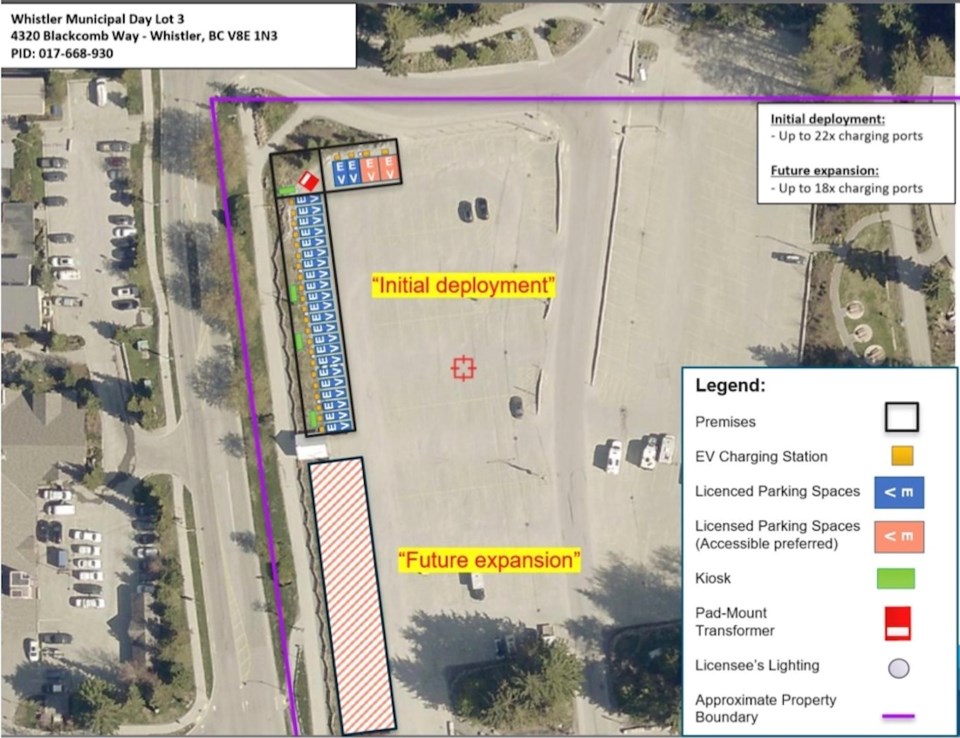Whistler’s council has endorsed a plan that would add up to 60 new EV charging points in two parking lots owned by the municipality.
Under a licence of occupation agreement approved at the July 23 regular council meeting, BC Hydro will install up to 42 chargers at the Resort Municipality of Whistler’s (RMOW) Day Lot 3, and up to 18 at the Whistler Conference Centre’s parking lots.
The new charging points add to the RMOW’s growing suite of EV charging stations in its goal to adhere to its "big moves" climate action policy, with the proliferation of EV charging options part of moves to de-carbonize commercial and passenger transportation to, and within, Whistler.
Speaking to the report, the RMOW’s climate action coordinator, Maria Thorlakson, said expanding the public charging network is important to keep up with the growing EV market, and a key part of the RMOW’s EV strategy.
“We can actually see what new registered vehicles we have in B.C., and in 2023, we saw that 20 per cent of new vehicles registered in B.C. were electric or plug-in hybrid vehicles, and that's up from 16 per cent in 2022, so we’re seeing those numbers increase quite rapidly,” she said, noting the numbers track with the province's zero-emissions vehicle sales targets, which require that 100 per cent of light-duty vehicles sold in B.C. be zero-emissions by 2035.
The RMOW’s own municipally-owned EV charging network is yielding data that backed up an increase in utilization, said Thorlakson, who said it made a “pretty strong case” for more charging stations.
Enter BC Hydro, which as Thorlakson explained, approached the RMOW with the proposal to install, maintain and operate the new chargers on municipal property free of charge.
BC Hydro already operates chargers at the Whistler Conference Centre, and has proven to be a reliable partner as a provider in the past, said Thorlakson, who added that BC Hydro was also the only provider that charged users based on power used, rather than time at a charger, “and this has been identified as a more fair, equitable and accurate way to charge for EV charging,” she said.
Additionally, she said the RMOW anticipates less fluctuation in fees for users, as BC Hydro rates must be approved by the BC Utility Commission.
As laid out in plans presented to council, the chargers installed at Day Lot 3 would be installed in two phases: The first would see up to 22 Level 2 chargers (which are the most common public charging types), followed by up to another 20 pending the rate of utilization.
The charging points in Day Lot 3 would be along the western perimeter of the lot, against the berm that separates the lot from Blackcomb Way. If all 42 chargers are installed, the entire western perimeter of the lot would be dedicated to charging stations.
Thorlakson said the RMOW engaged with BC Hydro to ensure the plans minimized the loss of existing regular parking stalls while ensuring there was enough space for the number of stalls proposed.
Under the agreement, the RMOW would continue to operate the Day Lot as it does now, in conjunction with Whistler Blackcomb, and it would also remain responsible for snow clearing. BC Hydro would be responsible for the installation, maintenance and operation of the charging infrastructure.
The layout of where additional charging stalls would go at the conference centre at both its underground and surface lot was not yet available, as those plans are still being drawn up, but according to the report there would be up to eight fast chargers in the surface lot, and up to 10 Level 2 chargers in the underground lot.
During questioning, Councillor Ralph Forsyth asked if users that wanted to charge paid both a Day Lot fee, and a charging fee, to which he was told yes.
In following up to ask what happened if a vehicle—EV or no—parked at a charging stall and was not using the charging infrastructure, staff said that technically they could be ticketed by bylaw, but could not say whether any such tickets had been issued in the past.
Coun. Arthur De Jong queried why Day Lot 3 was the focus in the BC Hydro agreement, and was told other lots already have charging infrastructure, while Lot 3 does not.
Coun. Cathy Jewett asked about the current numbers of EV chargers in the RMOW and how many were needed to meet expected demand going forward, to which Thorlakson said there are 53 Level 2 charging points and two fast chargers owned by the RMOW, combined with the various privately-owned hotel chargers as well as new chargers being installed at Whistler Marketplace.
“We’re getting close to the 172 (needed by 2025 according to RMOW estimates), which is great, and hopefully we can attract more of this,” said Jewett.
The agreement with BC Hydro is for a 10-year license to occupy the portions of Lot 3 and the Conference Centre car parks for the charging stalls ending on July 31, 2034.
Since the July 23 meeting, RMOW staff continue to meet with BC Hydro to coordinate on timeline, so there is currently no set date for rollout of the new infrastructure.
According to a communications official, installation at day lot 3 is earmarked to begin in Fall of 2024, with the goal of having the chargers operational before the 2024-2025 ski season. The Conference Centre would receive its new infrastructure in Winter, 2024-2025.




